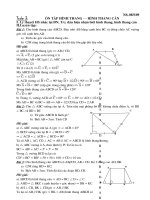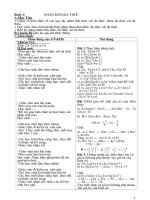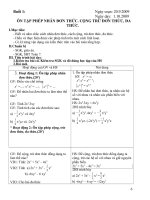giao an day them anh 8.doc
Bạn đang xem bản rút gọn của tài liệu. Xem và tải ngay bản đầy đủ của tài liệu tại đây (143.77 KB, 9 trang )
GIÁO ÁN DẠY THÊM ANH 8 - NĂM HỌC 2009 -2010
Date: 6 / 9 / 2009
Period 1: REVISION
Grade 8.
I. GRAMMAR:
1, Thời hiện tại đơn giản diễn tả chân lý/ sự thật hiển nhiên.
Form:
S + V(es) + O.
Ex: - The sun always rises in the east.
- The moon moves around the earth.
2, Cấu trúc:
Adj + enough + infinitive.
Ex: He is not tall enough tobe a good basketball player.
II. Do exercises:
1, put the verd in the brackets into the corrects form or tense.
a, I don't thinkI ( go) ............................. out tonight. I'm too tired.
b, the sun always ( rise) ........................... in the east. Look, it
( rise)........................
c, Where you ( spend) ............................... your summer holiday last year, Tam?
d, In my country, it ( not rain ) .................................. much in the winter.
e, Let's wait for Lien ( arrive ) ........................... and we 9 have )....................
dinner.
f, The moon (move) ................................ around the earth.
g, Mai ( be) ........................ very happy when she ( receive) ....................... a
letter fromher sister this moring.
h, She ( not drink ) .................... coffee.She ( drink ) .................... Coca Cola.
i, It ( be) .................... hot in the summer.
j, Rise ( not grow ) ............................ in cold climates.
2. Combine each of the following pairs of sentences into one sentences.
Using (not ) adjective + enoungh + to-infinitive.
a, He is tall. He can play vollayball.
_ ...........................................................................................................
b, My sister is old. She can drive a car.
_ ...........................................................................................................
c, the radio isn't small.You can't put it in your pocket.
_ ............................................................................................................
d, Those apples aren't ripe. We can't eat them.
_ .............................................................................................................
Giáo viên dạy: Bùi Thị Tuyết
GIÁO ÁN DẠY THÊM ANH 8 - NĂM HỌC 2009 -2010
e, The worker is clever. He can make fine things from wood.
_ .............................................................................................................
f, Mr. Robinson isn't rich. He can't buy a house.
_ .............................................................................................................
g, The weather was fine. We could go camping.
_ .............................................................................................................
h, This coat isn't warm. I don't wear it in the winter.
.............................................................................................................
-----------------------------------------------------------------
Date:12/9/2009
period 2: RIVISION
Grade 8
I. GRAMMAR:
1. Be going to : dự định
o We use “be going to” to express plans or intentions in the near future, it is
sure to happen.
For example
We are going to practice piano for two hours this evening.
She is going to travel abroad tomorrow.
o We also use “ be going to ” to predict.
For example
Oh, look ! it is going to rain. Look out, she is going to faint.
They are going to be married next May.
S + Be (am/is/are) + going to + Bare infinitive
o We can also use prepositon phrases to show place: in, on, at, behind, in
front
of, to the left of, to the right of, on the right, on the left.
For example
• We are sitting in the room.
• She stays at home
• The book is on the desk.
• She stands behind me
• Put the chairs in front of the board.
Giáo viên dạy: Bùi Thị Tuyết
GIÁO ÁN DẠY THÊM ANH 8 - NĂM HỌC 2009 -2010
• Grow flowers to the left of the house.
• Keep standing on the right.
II. Do exercise
1, Em hãy dùng cấu trúc " going to" và các động từ bên giới để viết hoàn
chỉnh mỗi câu sau.
1, Peter .......................................... some bread at the baker's.
2, I .................................................. some books from the library.
3, We .............................................. a play at the Star Movie Theater.
4, They............................................ a holiday in Nha trang.
5, She .............................................. a letter to her friend.
6, They ............................................ their children toys at Christmas.
7, I .................................................. some close friends to my birthday party.
8, She .............................................. a blu dress at her sister's wedding.
9, We .............................................. our grandma next weekend.
10, He .............................................chess in the Youth club.
2. Em hãy điền một giới từ vào ô trống.
a, Alexander Graham Bell was born ....................... March 3rd ,
1845 ....................... Scotland.
b, He worked ............................ deaf_mutes ................... Boston University.
c, I' ll come ...................... to pick her .................... at 8 o'clock.
d, Mrs. Lan call .................. her newspaper delivery.
e, I couldn't Miss Chi because ..............................
-----------------------------------------------------------------
Date: 20/9/2009
Period 3: RIVISION
- Grade 8 -
I. Grammar:
Reflexive pronouns
o We use reflexive pronouns to emphasize for Subject’s actions. It can stand
after main verb or object of main verb.
For example
He himself answered the phone, not his secretary.
He answered the phone himself.
Giáo viên dạy: Bùi Thị Tuyết
buy Write see borrow have
wear give visit invite play
GIÁO ÁN DẠY THÊM ANH 8 - NĂM HỌC 2009 -2010
o Reflexive pronoun usually refer to the subject of a sentence.
He looked at himself in the mirror.
o If we put reflexive pronoun after “ by ”, it means “ alone ”.
She lives by herself.
You must sleep by yourself tonight.
o The summary of reflexive pronouns
I myself ( tự tôi )
You yourself ( tự bạn )
He himself ( tự anh ấy )
It itself ( tự nó )
She herself (tự cô ấy )
You yourselves ( tự các bạn )
We ourselves ( tự chúng ta )
They themselves ( tự bọn họ )
II. Do exercises.
1. Choose the best answer.
1, The children are old enough to look after ............................
a, themselves b, ourselves c, herself d, for themselves
2, We ought .................... the warddrobe in the corner opposite the bed.
a, put b, pust c, to put d, to pust
3, You'll ....................... cook dinner yourself.
a, ought to b, must c, should d, have to
4, the calender is ....................... the clock, ........... the picture and the lamp.
a, on/ next to b, under/ between c, behind/ between d, above/ on
5, she worked hard ................... she could pass the final exam.
a, so that b, in order to c, as result d, so as to
6, Did you succeed ................. the problem.
a, to solve b, on solving c, in solving d, solvi
II. Supply the necessary reflexive pronoun.
1, We protect ............ from the rain with an umbrella.
2, Both boys taught .............. to swim.
3, The children amuse .............. with the kitten.
4, You will cut ............ with that knife if you are not careful.
Giáo viên dạy: Bùi Thị Tuyết
GIÁO ÁN DẠY THÊM ANH 8 - NĂM HỌC 2009 -2010
5, She likes to look at ............ in the nirror.
6, The boy is not old enough to dress.
7, The dog hurt ............. when it jumped over the fence.
8, Helen and I enjoyed .............. very much at the party last night.
9, You shouldn't really blame ......... for that mistake.
10, I must learn to control ...........
III. Supply the correct word form.
1, She's always worried about the ............... of her family. (safe)
2, Don't leave the light on. It wastes ............... . (electric)
3, Most teenagers like taking part in .............. servece. (communa)
4, This river is very .................. for swimmers. (danger)
5, The ............... of atom bomb is very terrible. (destroy)
6, Hard work always brings ................ . (succeed)
7, Those clothes are ................. for cold weather. (suit)
8, You nust put all medicines in ............ cupboards. (lock)
-----------------------------------------------------------------
Date: 1/10/2009
Period 4: RIVISION
Unit 4
Past simple tense: “Used to”
o We use “ used to ” to express the past habits. But now they don’t exist any
longer.
For example.
When she was a little girl, she used to swim in this river.
When we were in grade 7, we used to play soccer.
Used to (thường) + Bare infinitive
Prepositions of time: “ in , on, at, after, before, between ”
o In (vào) + (second / minute / hour / day / week / month / seasons / year )
In 20 seconds, she will leave here.
They start working in spring and end in summer.
She always gets up at 5.00 in the morning.
I was born in 1978.
o On (vào) + (holidays / days in a week / date)
• We are going to have a party for my mom on March 8.
• He has Math on Monday, Wednesday and Friday.
o At ( lúc ) + ( hour time )
• Minh goes to sleep at 10.00 p.m.
Giáo viên dạy: Bùi Thị Tuyết









